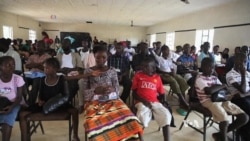Health systems in the West African countries worst hit by Ebola are struggling to contain the epidemic. A report from a British charity accuses Western countries of recruiting hundreds of doctors and nurses from Africa, severely weakening the frontline health services in the very countries where the disease has taken hold.
Amid the fear of the epidemic, a moment of joy for these patients in Sierra Leone.
Forty-five patients at the Hastings treatment center near the capital, Freetown, were confirmed to be Ebola-free on Wednesday. Fourteen-year-old survivor Hawanatu Turay expressed relief.
"I can eat fine, my stomach hurts no more, my head aches no more, and also my neck, nothing hurts and I have no more pains," said Turay.
The center is staffed exclusively by Sierra Leonean doctors. That’s rare in Sierra Leone’s crippled health system, says Martin Drewry, director of the charity Health Poverty Action.
“The important thing to remember is that whilst an Ebola outbreak is caused biologically, an Ebola epidemic is caused by a rundown, dysfunctional health system," said Drewry.
Drewry says under-investment is to blame - but so is the plundering by Western countries of health workers trained in Africa. A recent report from Health Poverty Action claims that Britain's National Health Service or NHS has recruited 10 percent of all Sierra Leone’s trained medical workers.
“Even before Ebola you had just 320 hospital beds in the whole of Sierra Leone. The system was that weak before Ebola. Now it’s incredibly weak and yet, at the same time, people like me in the UK are being treated by doctors and health workers whose training was paid for Sierra Leone. And that’s just wrong," he said.
In a statement, Britain's Department of Health said that 'health care professionals often want to spend time working in different health care systems to gain experience and skills.'
Martin Drewry says there is a compromise.
“We don’t want to stop people migrating at all. But if health workers from the poorest countries are coming to subsidize the health system of the richest countries, we should pay some compensation back into their health system to make up for that," said Drewry.
The British government highlights its leading role in the international fight against Ebola. London is deploying 750 military personnel. The United States is deploying 4,000 troops to fight Ebola in West Africa.
Those boots on the ground are vital in tackling Ebola, says Sophie Harman of Queen Mary University of London.
"If you send just money, you have a problem of what we call 'absorptive capacity'. Where does that money go? And how quickly can it take effect on the ground with helping these countries and the people that desperately need the resources?" Asked Harman.
Liberia is one of the worst hit countries. President Ellen Johnson Sirleaf recently urged the hundreds of Liberian medics working overseas to return home. But her own son - a trained doctor - has opted to stay working in his adopted homeland of the United States, saying he can do more to fight the disease there.





